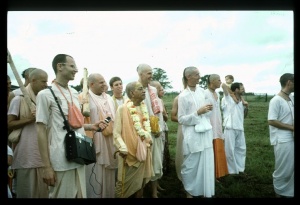SB 4.28.38

A.C. Bhaktivedanta Swami Prabhupada
TEXT 38
- tapasā vidyayā pakva-
- kaṣāyo niyamair yamaiḥ
- yuyuje brahmaṇy ātmānaṁ
- vijitākṣānilāśayaḥ
SYNONYMS
tapasā — by austerity; vidyayā — by education; pakva — burned up; kaṣāyaḥ — all dirty things; niyamaiḥ — by regulative principles; yamaiḥ — by self-control; yuyuje — he fixed; brahmaṇi — in spiritual realization; ātmānam — his self; vijita — completely controlled; akṣa — senses; anila — life; āśayaḥ — consciousness.
TRANSLATION
By worshiping, executing austerities and following the regulative principles, King Malayadhvaja conquered his senses, his life and his consciousness. Thus he fixed everything on the central point of the Supreme Brahman [Kṛṣṇa].
PURPORT
Whenever the word brahman appears, the impersonalists take this to mean the impersonal effulgence, the brahmajyoti. Actually, however, Parabrahman, the Supreme Brahman, is Kṛṣṇa, Vāsudeva. As stated in Bhagavad-gītā (BG 7.19), vāsudevaḥ sarvam iti: Vāsudeva extends everywhere as the impersonal Brahman. One cannot fix one's mind upon an impersonal "something." Bhagavad-gītā (BG 12.5) therefore says, kleśo 'dhikataras teṣām avyaktāsakta-cetasām: "For those whose minds are attached to the unmanifested, impersonal feature of the Supreme, advancement is very troublesome." Consequently, when it is said herein that King Malayadhvaja fixed his mind on Brahman, "Brahman" means the Supreme Personality of Godhead, Vāsudeva.